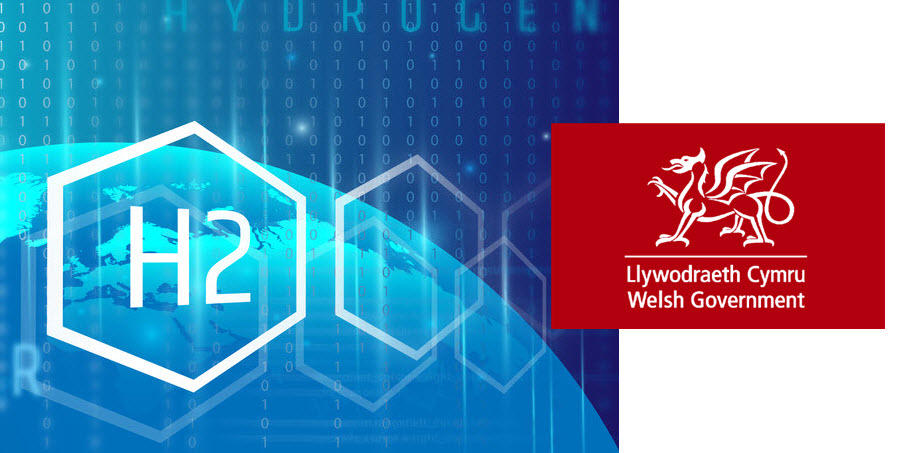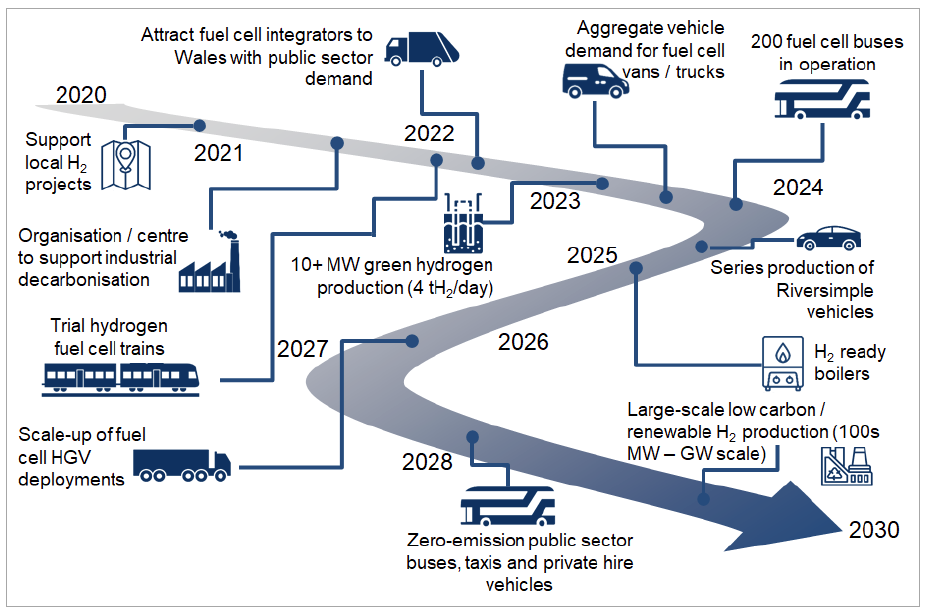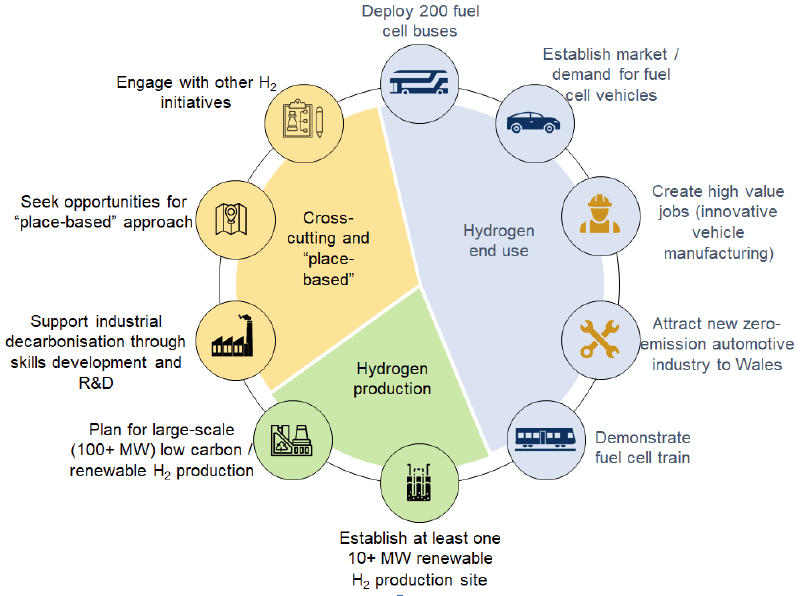
Low-carbon hydrogen is increasingly recognised by Governments around the world as having an important role to play in reducing GHG emissions, especially in sectors which are difficult to decarbonise with other solutions.
Projections from the Committee on Climate Change and others show a significant increase in low-carbon hydrogen demand by mid-century from existing levels. As part of Covid-19 economic stimulus packages the European Union and several EU Member States have announced significant funding support and ambitious delivery targets for low-carbon hydrogen production.
The UK Government has also announced investment and ambitions for hydrogen to be deployed across a range of sectors including transport, industry, power and heating. For example, in November 2020 the Government outlined a Ten Point Plan for a Green Industrial Revolution, which included a target to install 5GW of low carbon hydrogen production capacity in the UK by 2030 and up to £500m of funding to support new production facilities and trials of hydrogen for heat. More details are expected as part of the UK Hydrogen Strategy, due to be published in spring 2021. Hydrogen also features as part of the Energy White Paper issued December 2020.
In summer 2020 the Welsh Government commissioned Element Energy to study the opportunities for hydrogen across different sectors in Wales. The hydrogen pathway presented in this report builds on the Hydrogen Development in Wales: baselining report, which summarises the current hydrogen initiatives and hydrogen expertise in Wales, aligned with Welsh energy policy ambitions for achieving net zero ambitions.

A key aim of the hydrogen pathway is to inform activities that will take place in the short term (to 2025). At the time of writing (December 2020), the role of hydrogen in the energy sector as a whole is uncertain and will depend on national level policy making (e.g. strategy to decarbonise heat) and international developments (e.g. carbon taxation). Focusing on short term actions, whilst starting to plan for larger-scale projects in the mid- to long-term will ensure Wales is well positioned with respect to hydrogen and fuel cell technologies.
This hydrogen pathway presents ten key objectives, which will help to generate momentum in the Welsh hydrogen sector and lay the foundations for scale-up and commercial deployment from the end of the 2020s.
The objectives cover both hydrogen supply and end use, with a focus on short-term opportunities where the commercial case is more developed.

In no particular order recommended actions include:
- Deployment of 200 fuel cell buses in a town / city / region in Wales: fuel cell buses have been trialled across the UK and the technology is ready for deployment in larger fleets, which benefit from economies of scale. This initiative will create a consistent demand for low-carbon hydrogen and help Wales meet its target for all buses to be zero-emission by
- Establish Wales as an early market for commercial fuel cell vehicles: fuel cell vans and trucks are at an earlier stage of development than buses. The first commercial fuel cell trucks were delivered to customers in Europe in 2020. To bring these vehicles to Wales in the short-term, a sufficient customer demand is needed. Initiatives to coordinate demand for hydrogen fuel cell vans and trucks are already underway at a UK level. These include plans to develop standard specifications for vehicles which can be purchased at a scale which will attract vehicle manufacturers to bring fuel cell vans and trucks to the UK market. Engaging with these initiatives will help to bring zero-emission vans and trucks to Wales sooner and prepare for large- scale commercial deployments, expected from 2027
- Consider support for vehicle manufacturers such as Riversimple, a Wales- based designer and manufacturer of fuel cell electric vehicles: the company is developing a two-seater hydrogen fuel cell car and is looking for sites to manufacture the vehicle from 2022/23. Supporting manufacturers such as Riversimple to establish manufacturing bases in Wales will promote the fuel cell sector and create additional hydrogen-related jobs.
- Attract vehicle integrators to Wales: there is currently a lack of fuel cell vehicle options offered by vehicle manufacturers. Vehicle integrators can convert existing diesel or battery electric vehicles into hydrogen dual fuel or fuel cell range- extender vehicles, respectively. Coordinating demands for such vehicles, where pure battery electric is not suitable, within the Welsh public sector fleets would send a clear signal to the market of the potential for orders at a sufficient scale to attract vehicle integrators to establish bases in Wales, leading to local job
- Deploy fuel cell trains in Wales: Wales has several rural rail lines, by replacing diesel trains hydrogen fuel cell trains provide a decarbonisation solution. There are several fuel cell trains being developed for the UK market and future rolling stock orders should be compatible with the UK Government’s target for no diesel-only trains by 2040 and the broader Net Zero 2050
- Establish at least one renewable hydrogen production site 10+ MW by 2023 / 24: the business case for local renewable hydrogen production can be developed if there is sufficient demand for low-carbon hydrogen from the transport sector. This presents an opportunity for one or more hydrogen production sites in Wales, in the order of 10
- Scope large-scale hydrogen production sites: with hydrogen providing a route to decarbonisation for many difficult to decarbonise sectors, the demand for low- carbon hydrogen is set to increase. Given the time required from developing a concept to implementation of hydrogen production at scale, there is a need to begin planning low carbon / renewable hydrogen production and delivery facilities in parallel with the deployment of the initial smaller scale
- Support industrial decarbonisation through skills development and R&D: further research and development is required for industrial clusters to decarbonise. This sits alongside the need to address the skills gap for industrial fuel switching and the wider scale use of hydrogen as a fuel for industry. There is an opportunity for Wales to develop expertise focused on industrial decarbonisation and export these skills and offer training to other industrial
- Support local projects and place-based approaches: developing hydrogen projects creates opportunities to engage with the wider community through a place- based approach. Further community engagement should also help to develop public support for these hydrogen
- Engage with other hydrogen initiatives: there is a range of existing hydrogen initiatives which will further develop the hydrogen sector in Wales. While some of these opportunities will need more time to develop, on-going monitoring of wider activities in the sector and stakeholder engagement will support Wales’ hydrogen sector and decarbonisation
Read Entire Report
Read the most up to date Fuel Cell and Hydrogen Industry news at FuelCellsWorks




